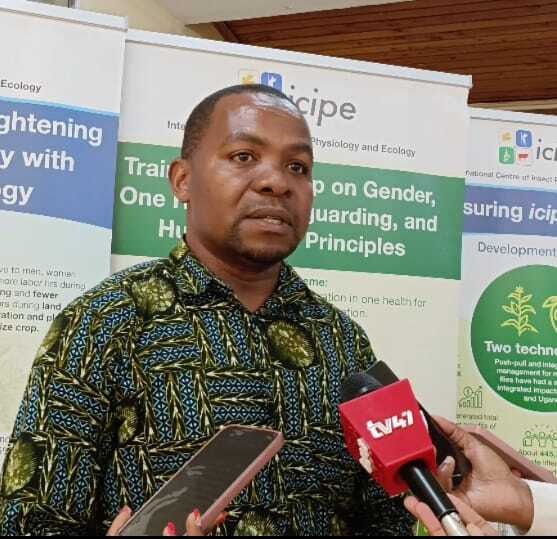By Christine Ochogo | christawine@yahoo.com
Experts have called for integration of One Health approach with gender in addressing health challenges and food insecurity for sustainable development.
According to World Health Organisation (WHO), ‘One Health’ is an integrated, unifying approach to balance and optimise the health of people, animals and the environment. It is particularly important to prevent, predict, detect, and respond to global health threats.
Dr Beatrice Muriithi, Gender and Impact Assessment Expert at International Center of Insect Physiology and Ecology (icipe), Nairobi, warned of dire consequences of ignoring any of the One Health aspect areas.
“We need to focus on One Health approach as it is coming from the understanding of the complex and the interconnectedness of various health challenges that affect humans, crops, animals and the ecosystem. If we do not embrace a One Health approach holistically, we will be leaning on one aspect area and leaving other aspects that are equally important,” advised Dr Muriithi.
She added, “If you address the crop health and ignore human or animal health, then one of them will pull the benefits of the others. But with more awareness, we can balance”.
Dr Muriithi spoke at icipe Duduville campus in Nairobi, during a two-day gender training workshop with researchers and partners working in various projects with a focus on One Health.
Mentioning gender disparities, Dr Muriithi said men, women and youth do not have similar starting points.
“There are gender disparities that limit especially women farmers and women in all spaces of One Health concept in terms of access to resources, financial inputs and many other productive resources. Such bar their potentials to benefit the same way as men. We therefore need to increase women empowerment,” she said.
According to Dr Rahma Adam, a senior scientist at WorldFish, gender and social inclusion issues have not received sufficient attention in the Agri-food and aquatic systems.
The scientist, while speaking at the conference, said the Agri-food systems as a whole was covered in a lot of micro-inequalities ranging from policies that are gender blind to issues of invisibility of women, youth and the marginalised communities involved in all the commodities value chain.
In conforming with Sustainable Development Goals (SDG) 5 that aims to achieve gender equality and empower all women and girls by 2030, she stressed the importance of unleashing women’s potential for them to meaningfully and befittingly participate in the agri-food system.

“Increasing women’s empowerment is essential for women’s well-being and has a positive impact on agricultural production, food security, diets and child nutrition,” Dr Adam said.
She added, “If there is gender equality and social inclusion embedded in a well-functioning Agri-food systems, there will be social cohesion and harmony in communities. This will boost good nutrition, economic development both in rural and urban areas and environmental sustainability, cushioning them against stress, diseases, and negative climate impacts.”
She noted the progress on laws at international levels regarding gender equality and inclusion. She however pointed out that much more still needed to be done at country levels, with various national agriculture research systems that collect data yearly to inform of the disparities in terms of women, youth, marginalised communities’ economic empowerment.
Dr Mohammed Dhamir Kombo Zanzibar Agricultural Research Institute Director General, speaking at the meeting, recognised the importance of women’s involvement in agricultural products value chain from production, marketing and processing.

“Women should be sensitised on how to make their work better. In Zanzibar, we have formulated gender-based budget to tackle challenges women face and support their empowerment,” Kombo explained.
Food and Agriculture Organisation of United Nations 2023 report dubbed “The status of women in the Agrifood System”, indicates that agri-food systems are more important sources of livelihood for women than for men in many countries, with sub-Saharan Africa enjoying 66 per cent of women’s employment in the sector, compared with 60 per cent men.
In southern Asia, women overwhelmingly work in agri-food systems (71 per cent), versus men’s 47 per cent). However, fewer women than men are in the labour force. Agri-food systems are a key source of employment for young women, aged between 15 and 24.
Despite the importance of agri-food systems for women’s livelihoods and the welfare of their families, women’s roles tend to be marginalised and their working conditions are likely to be worse than men’s – irregular, informal, part-time, low-skilled, labour intensive, increasing their vulnerability. Women also have higher burdens of unpaid care, limiting their opportunities for education and employment.
This report says despite increasing attention placed on gender since the Fourth World Conference on Women, held in Beijing in 1995, there are still large gaps in achieving gender equality in agri-food systems. – MESHA Science Features@2025









